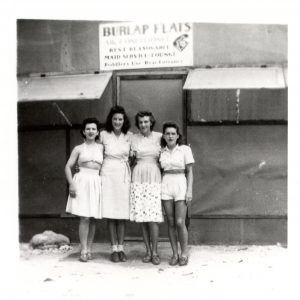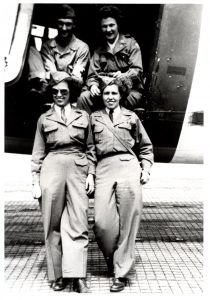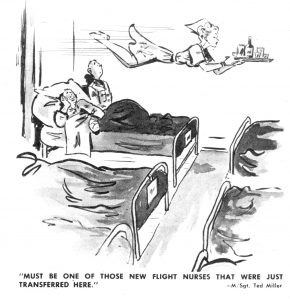In Memoriam
World War II Army Flight Nurses
Jenevieve (Jenny) Boyle Silk, who died in June 2017, was the last living of the 25 World War II US Army flight nurses whom I interviewed in 1986 for what became Beyond the Call of Duty: Army Flight Nursing in World War II. I clearly remember each of my interviews with these remarkable women and still can picture them and hear their voices when I think of them.
Twenty of these interviews are now digitized and available as audio recordings on the Imperial War Museum website. Access the interviews here:
My short remembrances are in the order in which I interviewed these former flight nurses.
Brooxie Mowrey Unick (1920–2005)
816 MAES, Europe
Brooxie Unick née MOWREY (Garfield Park Community Hospital School of Nursing, Chicago, 1941) began her nursing career working at a psychiatric hospital but decided that she wanted a chance to travel, so she applied to TWA for work as an airline hostess. She had passed the first two interviews in Chicago and was waiting for word about going to Kansas City for the final interview when the Japanese attacked Pearl Harbor. Brooxie explained:
And while I’m waiting for this final interview, December 7th came along. And so I kept waiting and got through the holidays. And in January, in the mid-West, you always get the doldrums because of the weather. So I got to thinking about it, and I remembered the letter I’d had from the airlines saying, “We’re awfully sorry. We have to change our program, because the armed forces need registered nurses now.” They wished me all kinds of luck. So I got to thinking, The armed forces need me? Okay.
She was just being patriotic, Brooxie said; she hadn’t heard about flight nursing at the time. Brooxie applied for military service, joining in 1942. She was given two choices for initial assignment, one in Michigan and one in south Texas. Since Brooxie wanted to travel, she chose the Texas base, which happened to be an Army Air Corps field. An assignment near Dallas followed six months later, during which time Mowrey applied for flight nurse training, was accepted, and traveled to Bowman Field, KY in November 1943, graduating from the flight nurse course on 21 January 1944.
As a member of the 816 MAES, Brooxie joined Jenny Boyle, Louise de Flon and Frances Crabtree to travel with the squadron to England prior to D-Day. Once overseas, the flight nurses initially had little to do, so they were sent in pairs to bomber bases – mostly to B-17 and B-24 squadrons – “with the idea that – it sounded grand – in an emergency, become familiar with the plane, so if you had to use the plane for evacuation, you could”. At those bases the flight nurses attended the early morning pre-flight briefings, then worked in the base medical facility until time for the planes to return. Brooxie picks up the story:
And then when the planes came in, we’d also be on the flight line. And then as soon as most of the planes were in, one of our jobs – we got, at least I got a kick out of it – would be after their initial debriefing, they would get a shot of whiskey, and I would like to pass out the whiskey. And it seemed to give them a lift by doing it. … they’d reach for the glass, and it was kind of a double-take when they saw who was there.
Brooxie recalled a memorable mission during the Battle of the Bulge when first weather, then German strafing delayed take-off with patients.
And I was standing there alone in the door of the ship talking to one of the crewmen, and the Germans came over to strafe again. And I was thinking, Hey, we’re lined up nose to tail. And I don’t know what’s in all those supplies along the side. If it hits one of them, I’d better get out of here. So, I jumped out, and I was running for an open field. But I remembered at the time reaching in my pocket and taking gloves out, because I thought, Now, when I get out there, I’m going to hit the dirt. And I don’t want to hurt my hands. And when they finally did bring the patients back, we just got them on as fast as we could so we could get out of there. And it was the next day.
When asked if she thought her training had prepared her for her flight nurse duties, Brooxie quipped, “Maybe in small ways. But it didn’t work out. … There was a lot of nice theory, but it doesn’t always apply.” But Brooxie, like her flight nurse colleagues, found a way to make it work out. As she put it:
Well, it was a case of the situation was there – you had to make the most of it. You certainly weren’t treated to silk sheets or anything – you didn’t expect it. At least I felt I was doing a credible job and all. A lot of people can win a war besides shooting a gun, and the ambulance drivers, the clerks that take care of the paperwork – which, unfortunately has to be done. But everyone has a point. And I can’t think of anything I would change.
To listen to my interview with Brooxie Unick, click on the link:
https://www.iwm.org.uk/collections/item/object/80011368
Interviewed 25 May 1986, Satellite Beach, FL
Learn more about my interview with Brooxie on the Blog for 14 Aug 2016.
To be continued



